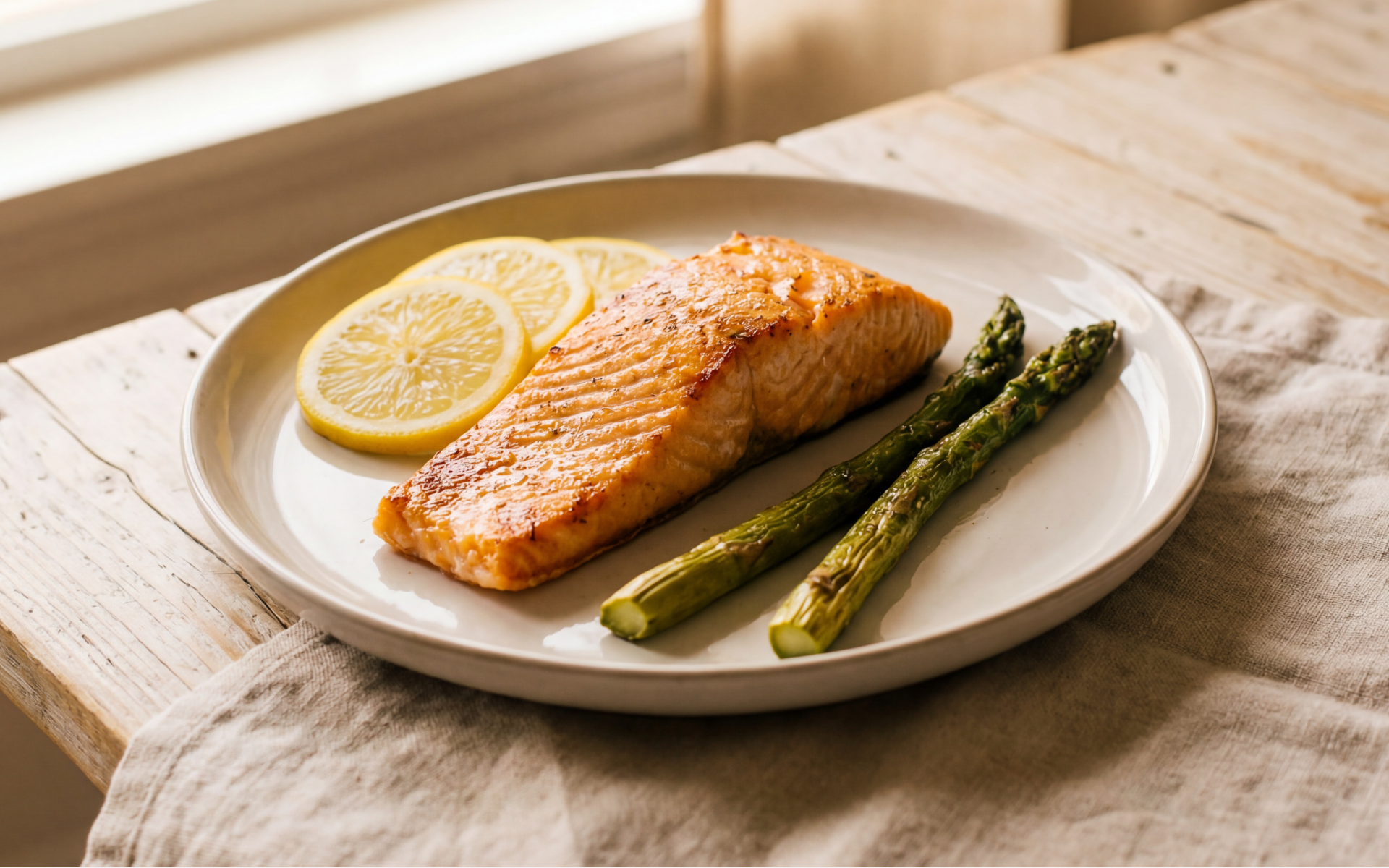The practice of fasting stretches far back into human history. For centuries, people have been preoccupied with the purported health benefits of voluntary starvation or prolonged hunger. Whether for religious reasons, health, or politics, fasting has existed in almost every era.
In recent decades, intermittent fasting (IF) has captured the attention of fitness experts. This sustainable approach to weight loss is often praised for its impact. The science-backed benefits of this method and its ability to help people become mentally and physically fit make it worthy of consideration. However, adults who have reached the age of 50 or 60 shouldn’t take the leap without first seeking professional assistance.
Factors such as slow metabolism, reduced lean muscle mass, and declining physical activity are reasons intermittent fasting needs careful planning in older ages (1). But let’s not toss it out of the window altogether!
Intermittent fasting for 65-year-olds and seniors can generally bring many benefits. The fact that you don’t need to limit your diet or track calories makes it an easy plan to follow. This article takes a deep dive into intermittent fasting for those over the age of 65, followed by some tips to maximize its effectiveness.
What Is Intermittent Fasting for Those Aged 65+?
For starters, you should know that intermittent fasting isn’t a diet plan. Instead, it’s a time-restricted eating approach where you must keep yourself from eating for a specific period of time. By skipping meals or limiting them to a specific time, adults can reach their weight loss goals while managing their blood sugar levels (2).
As we age, our bodies tend to manage blood sugar better, so fasting may benefit seniors more than younger people. Although fasting might sound challenging, it doesn’t need to be extreme or complicated. You can start by skipping one typical meal period and gradually add more if you feel comfortable.
Some common intermittent fasting variations for seniors include:
Daily Method
This is one of the popular IF methods. It typically follows an 18/6 or 16/8 rule. You must eat healthy foods regularly during the 6- or 8-hour window daily, then fast for the remaining 16 or 18 hours. Many people feel that this is a sustainable intermittent fasting method to follow.
You can also use smaller fasting timeframes to get started. These include 12/12, which involves 12 hours of fasting and 12 hours of eating.
Reasons why BetterMe is a safe bet: a wide range of calorie-blasting workouts, finger-licking recipes, 24/7 support, challenges that’ll keep you on your best game, and that just scratches the surface! Start using our app and watch the magic happen.
5:2 Method
This approach directs people to eat healthy meals 5 days a week. You then limit yourself to eating 500 or 600 calories during 2 other non-consecutive days. It’s not yet evident whether you should eat all your calories in one meal or spread them across the day.
24-Hour Method
This method involves fasting for 24 hours before you start to eat again. People who implement this approach can fast from breakfast to breakfast or lunch to lunch. This fasting plan may be followed once or twice per week.
Be careful if you try this method as it can cause mood swings, tiredness, and headaches and may not offer extra health benefits.
Alternate Method
If you opt for this method, you can eat regular meals every other day. You can then eat only 25% of your required caloric needs on the designated days. Let’s say you eat 1,800 calories on a regular day – you’ll try to eat only 450 calories on the fasting days.
The methods listed above are to give you an idea of how intermittent fasting works. It’s essential that you consult your doctor before you start a fasting plan. Once you get the green light, ask them or your nutritionist to create a chart of intermittent fasting for seniors.
Mark Mattson, a neuroscientist at Johns Hopkins, has researched intermittent fasting for 25 years. His studies suggest that the body may take two to four weeks to adapt to the fasting routine. During this time, you may experience hunger or irritability as you adjust. He also notes that people who get through this phase usually continue with the plan as they start to feel better.
However, the plan you choose depends on a number of individual factors. Closely analyze different intermittent fasting approaches, study the pros and cons, and choose a method that fits your lifestyle and physical health.
Our previous article covers everything you need to know about the 20/4 Intermittent Fasting method.
Is Intermittent Fasting Good for 65-Year-Olds?
Although it’s effective, intermittent fasting isn’t recommended for all people due to factors such as age, hormonal status, or physical fitness. However, a well-designed plan that caters to every aspect of an individual’s needs can help seniors reach their fitness objectives. Therefore, intermittent fasting is generally considered to be good and safe for people above 65 as long as several conditions are met (3). The person must stay well-hydrated throughout fasting and consume a healthy, balanced diet during the eating window.
Some benefits of intermittent fasting for people over 65 include:
It Can Help Them Lose Weight
Weight loss is the primary reason why intermittent fasting has become popular (4). Many seniors can benefit from this practice by adopting easier approaches such as 16:8 fasts. This method provides an 8-hour eating window and a 16-hour fasting window. Adults may choose to follow it in a manner so that most of the fasting window is covered in sleep.
While methods of strict fasting or cutting calories severely for two days a week exist, seniors often favor the 16:8 intermittent fasting plan. It often allows for long-term adherence and overall positive outcomes.
It Can Induce the Cellular Repair Process
During fasting, our bodies initiate a cellular waste-removal process called autophagy. This is a process where cells break down and recycle damaged proteins that accumulate over time (5). Proven research from 2023 revealed that intermittent fasting can trigger autophagy, further enhancing its potential advantages (6).
Read more: Building Muscle with Intermittent Fasting: What You Need to Know
It May Boost Cognitive Functions
A diet enriched with carbs and sugar has been linked to a decline in memory and an increase in mental health issues (7). This happens when starch and sugar in the food convert to glucose during digestion in the stomach. A spike in glucose level could be a culprit behind slow cognitive function. Doing intermittent fasting on alternate days may help with this.
When food isn’t available, the body uses its glycogen reserves that are stored in the liver and muscles. Once this energy source is exhausted, the liver transforms fat into ketones, an alternative energy source for the cells. Ketones may be uniquely beneficial for brain function as they generate fewer harmful reactive oxygen species than glucose metabolism (8).
It Helps Improve Longevity
Animal studies have shown that as with a calorie-deficit diet plan, intermittent fasting can extend a person’s lifespan. A study in 2017 showed that mice who fasted every other day lived approximately 13% longer (8). Another study in 2019 found that fasting also improved the overall health of male mice and delayed age-related problems like fatty liver (9). More research is required to see if these benefits apply to humans.
The benefits mentioned here indicate that intermittent fasting is generally safe for apparently healthy people over 65. You should talk to a licensed healthcare professional to ensure you can make an informed decision about the dietary pattern that best suits your needs. This means having a comprehensive list of intermittent fasting recipes, recommended schedules, and any physical exercise you should perform to make the most out of this new lifestyle change.
What Is the Best Intermittent Fasting Schedule for My Age?
Customization plays a pivotal role when it comes to intermittent fasting. It’s important to keep in mind that there’s no one-size-fits-all approach. The ideal way to begin creating a plan is to seek professional assistance. A basic chart is provided below which gives you an idea of how IF could work for each age bracket.
| Age Group | Considerations | Possible Intermittent Fasting Schedule |
|---|---|---|
| 18 – 30 | Your social dynamics | Flexible schedule such as 18:6 or 16:8 |
| 30 – 45 | Your work-life schedule | Basic and easy schedules such as 16:8 and 14:10 |
| 45 – 60 | Weight gain due to age | Weight-loss-oriented fasting periods such as 18:6 or 16:8 |
| 60+ | Type of nutrients you consume | Short fasting periods such as 16:8, 14:10, or 12:12 |
Generally, young adults with vibrant social lives tend to have more unhealthy eating patterns than any other age group. Similarly, people in the 30-45 age bracket struggle to create a work-life balance, which makes following a structured intermittent fasting routine challenging.
At the same time, adults over 45 years old may experience weight gain. Often, people who are over 65 could be accustomed to following a restricted diet plan due to chronic medical conditions.
Unwanted weight gain is also prevalent among women who are undergoing menopause. Therefore, speaking to a specialist is essential. They can decipher the different requirements as intermittent fasting for women over 65 has different protocols than that of younger groups.
When it comes to weight loss, progress is made by inches, not miles, so it’s much harder to track and a lot easier to give up. The BetterMe: Health Coaching app is your personal trainer, nutritionist, and support system all in one. Start using our app to stay on track and hold yourself accountable!
How Long Does it Take for 16:8 Intermittent Fasting to Work?
For starters, it’s important to know that intermittent fasting isn’t magic. You can’t expect yourself to drop two sizes in just 2 weeks. It will take some time for your body to adjust to this schedule. So don’t hope for instant outcomes. You must typically wait 2 – 4 weeks to see or feel any results.
Studies conducted in this domain reveal that intermittent fasting often yields sustainable results. Unlike a fad diet that could help you lose 5 or 10 pounds in a month, these plans are devised for long-term benefits. A recent compilation, “Intermittent Fasting and Obesity-Related Health Outcomes: An Umbrella Review of Meta-analyses of Randomized Clinical Trials”, suggested that having a shorter eating window could help you lose some weight (10).
However, the plan you choose depends on a number of individual factors. Closely analyze the different kinds of plans, study the pros and cons of intermittent fasting, and choose a method that suits your lifestyle and personal health needs.
Does Intermittent Fasting Really Slow Aging?
Staying youthful forever is a myth. However, you can turn to the next-best option, which could be the anti-aging impact of intermittent fasting. This triggers multiple changes in your body that keep DNA and cells healthy. This also tends to slow down the aging process.
University of Southern California Leonard Davis School Professor Valter Longo developed the Fasting Mimicking Diet (FMD), a five-day plan high in unsaturated fats but low in protein, carbs, and calories.
This research is groundbreaking as it’s the first to show that a food-based approach may make people biologically younger without needing constant dietary or lifestyle changes (11). This conclusion is based on reduced risk factors for age-related diseases and a proven method for measuring biological age created by Dr. Morgan E. Levine of Altos Labs and formerly the Yale School of Medicine.
Intermittent fasting is based on similar principles. It was shown that restricting calories can reduce cell damage and help nurture healthy DNA. All of these factors may combine to create an anti-aging impact.
At What Age Should You Avoid Intermittent Fasting?
Intermittent fasting doesn’t suit everyone. Here’s a list of people who shouldn’t try any form of intermittent fasting:
- Children under 18 years
- Pregnant or breastfeeding mothers
- Those who have had eating disorders in the past
If you’re not in any of these categories, you should be good to go. Try to find a suitable regime under expert guidance. A customized IF plan tends to provide more benefits than a general one. For example, intermittent fasting for menopause has different instructions than fasts that are recommended for perimenopausal ladies.
An informed adoption of IF can help you enjoy more perks and keep most drawbacks at bay.
Read more: 7 Day Vegan Intermittent Fasting Meal Plan for Optimal Nutrition
Is Intermittent Fasting Bad for the Heart?
No. In fact, some studies have shown that intermittent fasting can be beneficial for cardiovascular health as people lose weight. Dr. Armen Yerevanian, an endocrinologist at Harvard-affiliated Massachusetts General Hospital, has stated that intermittent fasting is generally considered safe.
However, it’s strongly recommended that you discuss this with a cardiologist if you have a history of heart conditions. They can guide you according to your medical profile and help you make the most of this lifestyle modification.
Fasting on just water can lead to rapid weight loss. Research has shown that you could drop up to 2 pounds daily (13). However, this weight loss mainly comes from the loss of water, carbs, and muscle, not fat loss. The 16:8 method is popular as it aligns with our natural sleep patterns. As you already fast while sleeping, extending the fast by skipping breakfast and eating lunch a bit earlier is relatively easy. One downside to fasting can be the monotony of drinking just water. You can also drink plain lemon water as it contains minimal calories, which are unlikely to affect your fast. No, olive oil doesn’t break a fast.Frequently Asked Questions
How much weight can you lose after a 3-day water fast?
What are the best hours for intermittent fasting?
Does lemon water break a fast?
Does olive oil break a fast?
Summary
Intermittent fasting for those aged 65+ could be an effective and versatile dietary approach. Its adaptability to different nutritional needs makes it a promising avenue for adult health promotion. The holistic well-being and mental clarity offered by an IF plan can supersede many traditional dietary methods. Simply look for age-specific strategies to reap the most rewards. It could be a journey toward a healthier, happier, and more independent adulthood if you follow the right directions.
DISCLAIMER:
This article is intended for general informational purposes only and does not serve to address individual circumstances. It is not a substitute for professional advice or help and should not be relied on for making any kind of decision-making. Any action taken as a direct or indirect result of the information in this article is entirely at your own risk and is your sole responsibility.
BetterMe, its content staff, and its medical advisors accept no responsibility for inaccuracies, errors, misstatements, inconsistencies, or omissions and specifically disclaim any liability, loss or risk, personal, professional or otherwise, which may be incurred as a consequence, directly or indirectly, of the use and/or application of any content.
You should always seek the advice of your physician or other qualified health provider with any questions you may have regarding a medical condition or your specific situation. Never disregard professional medical advice or delay seeking it because of BetterMe content. If you suspect or think you may have a medical emergency, call your doctor.
SOURCES:
- INTERMITTENT FASTING AND HUMAN METABOLIC HEALTH (2015, ncbi.nlm.nih.gov)
- The Impact of Time-Restricted Meal Intake on Glycemic Control and Weight Management in Type 2 Diabetes Mellitus Patients: An 18-Month Longitudinal Study (2024, ncbi.nlm.nih.gov)
- Beneficial effects of intermittent fasting: a narrative review (2023, ncbi.nlm.nih.gov)
- Effectiveness of intermittent fasting for weight loss in individuals with obesity: A meta-analysis of randomized controlled trials (2023, sciencedirect.com)
- Autophagy in the Pathogenesis of Disease (2009, ncbi.nlm.nih.gov)
- The effect of prolonged intermittent fasting on autophagy, inflammasome and senescence genes expressions: An exploratory study in healthy young males (2023, sciencedirect.com)
- Diet-Induced Cognitive Deficits: The Role of Fat and Sugar, Potential Mechanisms and Nutritional Interventions (2015, ncbi.nlm.nih.gov)
- Reduced Mitochondrial ROS Production in Peripheral Nerves of Mice Fed a Ketogenic Diet (2018, ncbi.nlm.nih.gov)
- Daily Fasting Improves Health and Survival in Male Mice Independent of Diet Composition and Calories (2019, cell.com)
- Intermittent Fasting and Obesity-Related Health OutcomesAn Umbrella Review of Meta-analyses of Randomized Clinical Trials (2021, jamanetwork.com)
- Fasting-mimicking diet causes hepatic and blood markers changes indicating reduced biological age and disease risk (2024, nature.com)
- Water fasts can help you lose weight, but you might gain it back quickly (2023, today.uic.edu)
- Efficacy and safety of prolonged water fasting: a narrative review of human trials (2023, academic.oup.com)











